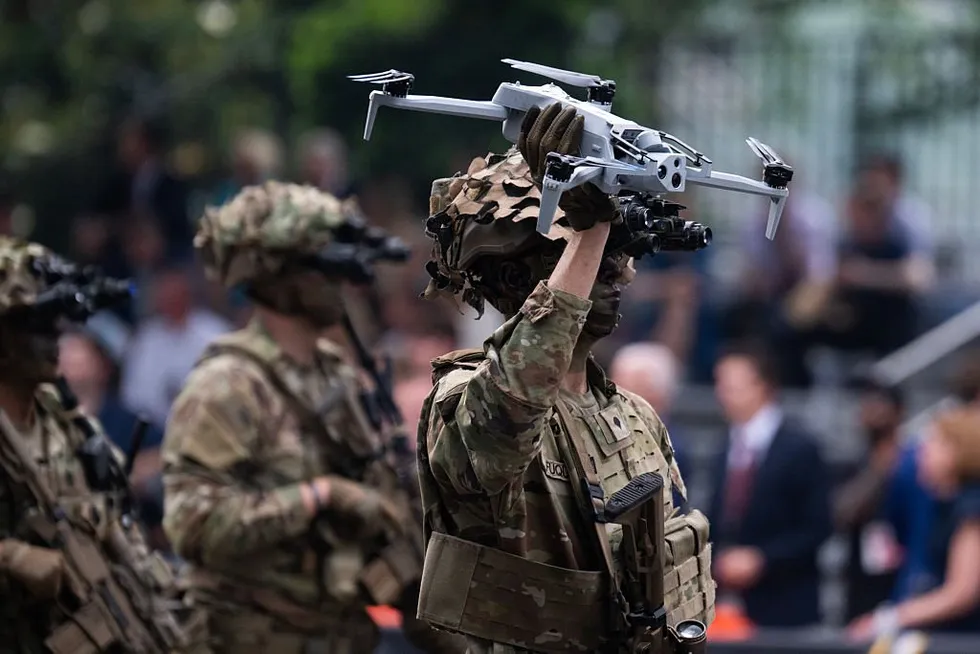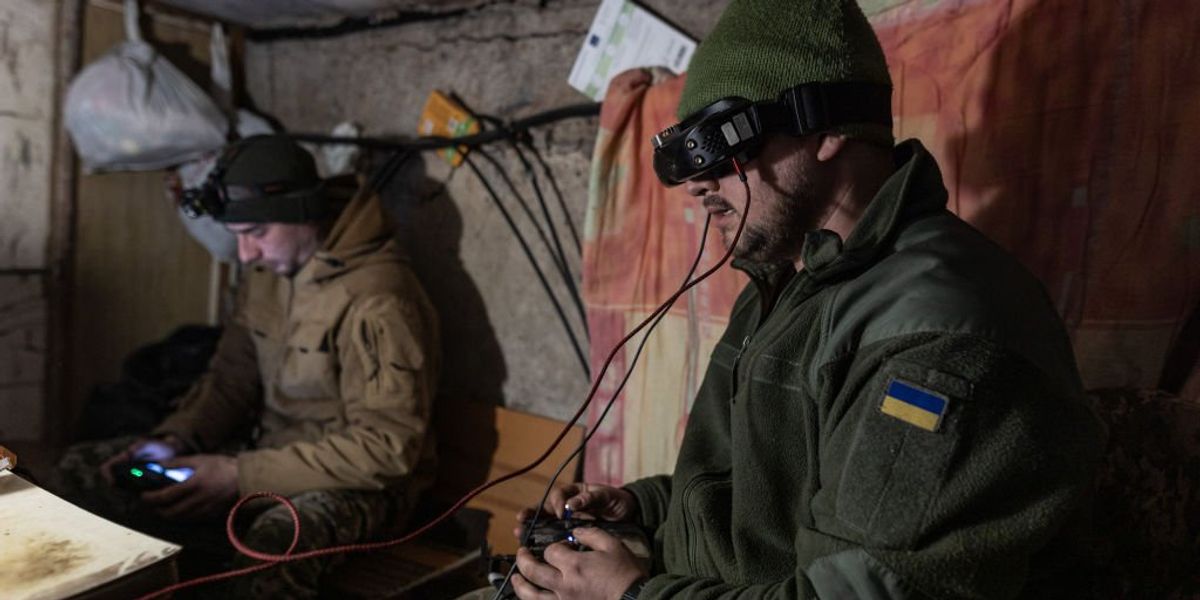The steel-driving man of American legend, John Henry, attempted to beat the machine — and won, though it cost him his life. At the Abu Dhabi Autonomous Racing League’s (A2RL) Drone Championship in April, man tried to beat the machine and lost — and the technology responsible could soon claim many a life on battlefields the world over.
There were four race formats at the drone competition co-hosted by the Drone Champions League and A2RL this past April in Abu Dhabi: an autonomous drag race where lightweight flyers fired through multiple gates at speeds of over 93 mph; a multi-drone race; an AI grand challenge; and a match pitting elite DCL human pilots against an autonomous drone.
In the fourth type of race, an autonomous quadcopter drone built and trained by a team of scientists and students at Delft University of Technology’s aerospace engineering MAVLab in the Netherlands beat three former DCL world champions, reaching speeds on the winding indoor track of nearly 60 mph.
A2RL concluded in a release that the races demonstrated that “AI, when given the right tools, can make complex, real-time decisions in a dynamic physical world. And it can do so safely, at speed, and at scale.”
‘Autonomous drone racing is an ideal test case for developing and demonstrating highly efficient, robust AI.’
Footage shows the drone whip effortlessly through a series of 22 indoor gates using only a front-facing camera and a motion sensor.
According to the university, the feat — possible because their “efficient and robust AI system [is] capable of split-second, high-performance control” — was historic.
Humans have been losing in games played virtually to supercomputers for decades. However, the university noted that “this achievement happened in the real world.”
RELATED: Ukraine drone strikes just changed EVERYTHING about warfare
An FPV drone controlled via a fiber-optic cable flies during Ukrainian military training on January 29, 2025 in Kyiv Oblast, Ukraine. Photo by Dan Bashakov/Global Images Ukraine via Getty Images
Team lead Christophe De Wagter said in a statement, “I always wondered when AI would be able to compete with human drone racing pilots in real competitions. I’m extremely proud of the team that we were able to make it happen already this year.”
“I hope that this achievement and this type of competition in general forms a springboard for real-world robot applications,” added De Wagter. “Robot AI is limited by the required computational and energy resources. Autonomous drone racing is an ideal test case for developing and demonstrating highly efficient, robust AI.”
The efficacy of autonomous drones on the raceway certainly has implications for the future of warfare.
Already in Ukraine, drones — which Kyiv is on track to produce 2.5 million of annually — have blunted the competitive edge of state-of-the-art bomber aircraft and armor and now reportedly cause an estimated 70% of deaths and injuries. The vast majority of drones in the war are, however, human-operated.
A special report published earlier this month by the Institute for the Study of War noted that “Russia and Ukraine are engaged in an active technological race to develop and deploy drones with artificial intelligence (AI) and machine learning (ML) capabilities” as doing so would reduce their reliance on human drone operators and defenders, overcome human limitations in target identification, and accelerate decision-making processes involved in drone warfare.
The warring nations have reportedly demonstrated some integration of AI capabilities into drones as of last month but have not deployed them on scale in the battlefield.
In one instance, a Ukrainian electronic and radio warfare expert observed Russian forces field a swarm of six drones, each of which carry a 6.6 pound warhead and have a range of up to 50 miles.
RELATED: A brutal wake-up call from America’s most powerful banker

ISW noted that Ukrainian forces, on the other hand, deployed a new AI-powered “mother drone” on the frontlines in late May — a drone that can reportedly deploy two first-person-view drones and launch a strike at a range of 186 miles.
The mothership was created by the Ukrainian startup Strategy Force Solutions.
The CTO of the company, who identified himself only as Andrii, told Forbes, “A $10,000 mission replaces what previously required $3-$5 million missile systems.”
“By pairing them [small FPV type drones] with AI mothership drones, we can guarantee precision strikes,” added Andrii.
The TU Delft drone evidences a technological leap that if utilized in the warring nation’s UAVs could mean greater effectiveness when attacking in dynamic combat zones as greater difficulty on the part of targets to evade or shoot them down.
The Dutch university indicated that one of the novel aspects of the racer drone’s AI is its use of a deep neural network originally developed by the Advanced Concepts Team at the European Space Agency, which enables the system to bypass a traditional human controller and direct commands straight to the motors.
“Traditional, human-engineered algorithms for optimal control were computationally so expensive that they would never be able to run onboard resource-constrained systems such as drones or satellites,” said the university. “ESA found that deep neural networks were able to mimic the outcomes of traditional algorithms, while requiring orders of magnitude less processing time.”
“We now train the deep neural networks with reinforcement learning, a form of learning by trial and error,” said De Wagter. “This allows the drone to more closely approach the physical limits of the system. To get there, though, we had to redesign not only the training procedure for the control but also how we can learn about the drone’s dynamics from its own onboard sensory data.”
According to a MarketDigits 2023 projection, the autonomous drone market will reach $53.4 billion by 2030, growing at a compound annual growth rate of 18.9% during the forecast period.
Like Blaze News? Bypass the censors, sign up for our newsletters, and get stories like this direct to your inbox. Sign up here!
Read the full article here







![GOP Early Voting Surge Narrows Democrat Advantage in Key Battlegrounds [WATCH] GOP Early Voting Surge Narrows Democrat Advantage in Key Battlegrounds [WATCH]](https://www.lifezette.com/wp-content/uploads/2025/08/2025.08.31-10.52-lifezette-68b4297fb6087.jpg)



![Biden’s FBI Entrapment Sting on Tom Homan Exposed, MSNBC Still Tries to Spin It [WATCH] Biden’s FBI Entrapment Sting on Tom Homan Exposed, MSNBC Still Tries to Spin It [WATCH]](https://www.lifezette.com/wp-content/uploads/2025/09/2025.09.23-03.12-lifezette-68d2b8f5ad06b.jpg)
